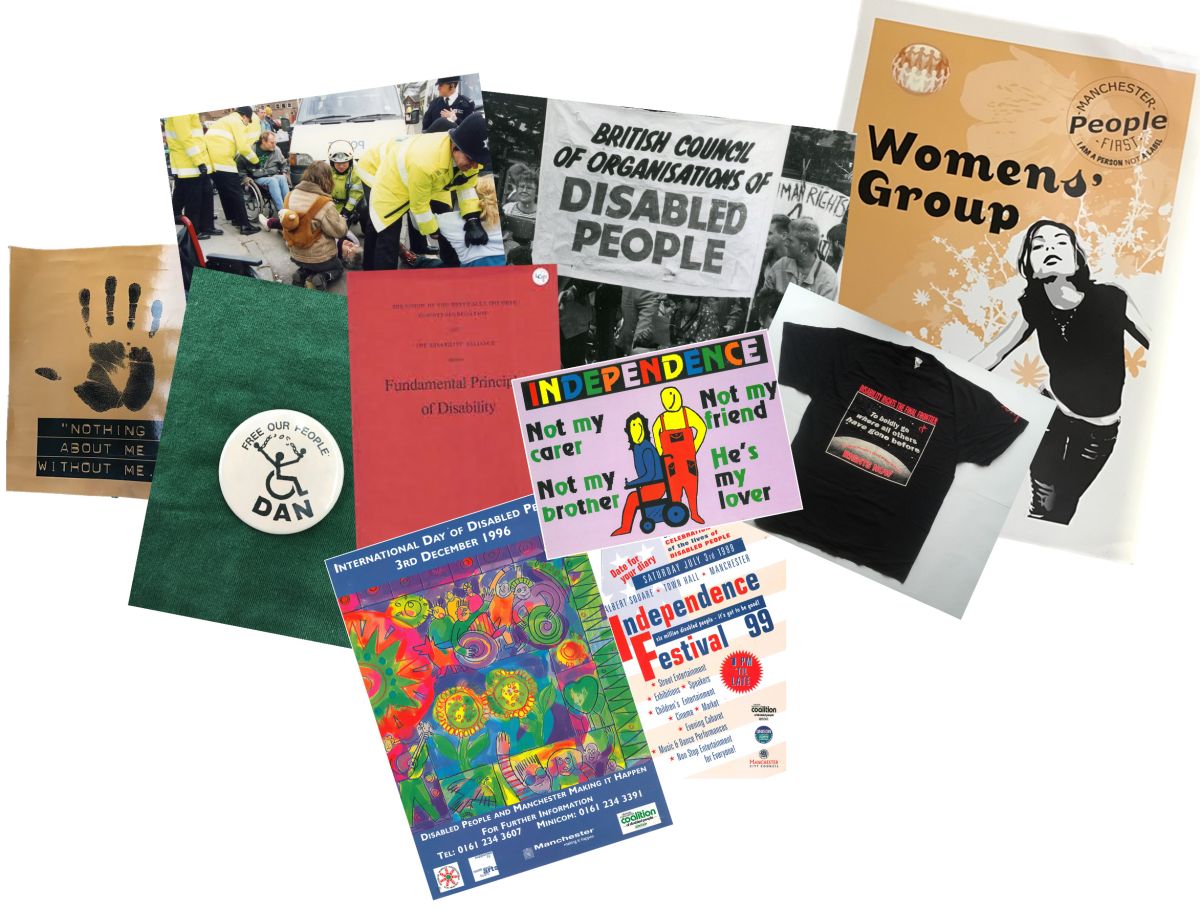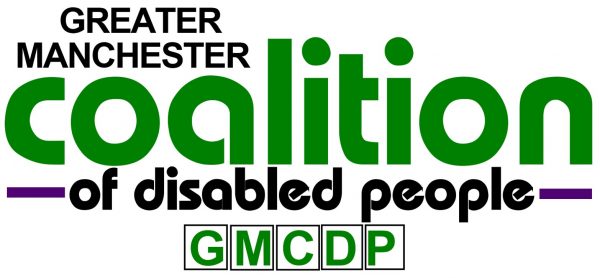Acknowledging history: talking about disabled people’s activism at GMCDP
By Aisha Al-Janabi and Jasmine Taylor

Until the 22nd of December, it is UK Disability History Month – a month that celebrates and raises awareness of disabled people’s activism and history. We thought this would be the perfect opportunity to head down to the Greater Manchester Coalition of Disabled People (GMCDP) and speak to Linda Marsh, an archivist for the organisation. We were greeted with tea and biscuits and certainly learned more than we can fit into this one article.
Linda explained that:
“GMCDP is a membership organisation which gives disabled people a collective voice and promotes the removal of barriers. GMCDP also offers advocacy support for disabled individuals ages 15-25 living in Manchester as well as hosting some events and workshops for disabled people of all ages. GMCDP signposts people who are outside the age range and/or geographical area for the advocacy project to other available services – despite the diminishing capacities and funding cuts many of these have experienced recently.”
In several areas of Manchester, there are no other networks for issues such as advocacy. Linda recognises the current challenging climate, and the lack of support for many going through Personal Independence Payment (PIP) and Employment and Support Allowance (ESA) issues, affirming that the Coalition will try their best to help source support.
Linda provided us with a rich account of the values of the Coalition. She made clear that the GMCDP does not exclude anybody, regardless of impairment or perceived impairment. The organisation operates on a social, rather than medical, model of disability which was developed in the 1970s when the Union of the Physically Impaired Against Segregation (UPIAS) was formed and began to change how we define disability. This was the beginning of the Social Model of Disability which rejects the idea that the individual should change; instead, society needs to change and remove the barriers it imposes upon the community. As Linda explained: “Disability for us is barriers and is out there in society, we as people don’t have disabilities.”
We discussed the impact that language has and its importance for social change. Linda described how phasing out problematic terms demonstrates that understanding is continuing to evolve and improve. Even when she first got involved with GMCDP 26 years ago, people were still using terms such as “able-bodied” instead of the accepted “non-disabled”, highlighting that some change has been achieved in recent years, although more awareness is still needed.
Since 2016, GMCDP has been working with Archive + at the Central Library, who have been supportive and really value “not just the fact it’s an old piece of paper, but they also value the stories behind the archives”. The collection is often added to through donations which will make this a unique and extensive collection. One example Linda described was a windsock from the American grassroots campaign group ADAPT, from an annual weekend of protests and demonstrations, which has somehow made its way to Manchester and into this collection.
The archive was started in 2005 and holds a variety of artifacts dating back to the 1950s. This includes handwritten planning notes and parking permits from a rally in 1990 in Manchester’s Albert Square which was calling for improved benefits for disabled people. Talking to Linda it’s clear that archiving this history is important for “acknowledging people who campaigned for something as basic as being able to use a bus”. This was something that was hoped to be achieved with the Disability Discrimination Act (DDA) in 1995, however, public transport still needs improvements to be made when considering accessibility. Linda hopes that sharing disabled people’s history will show “someone who is having a difficult time, that we’ve got this history of coming together as disabled people to challenge these negative experiences, I hope that it will give them some self-identity and to start believing in themselves.”
We spoke about how disabled people’s activism has changed over the decades, which in the early days was more specific than it is now. One example of this is Disabled Motoring UK, founded in 1922, after WWI, and was a group of veterans who had been injured. They aimed “to work out adaptations for cars and support each other with information”. In the 1930s, after this group lobbied, the government agreed disabled people could have driving licenses and was one of the first recorded organisation run entirely by, and for, disabled people.
A more recent wave of activism was in the 1970s, focusing on the improvement of living arrangements and involved multiple organisations. At the time there were two options – either living in an inaccessible house with your family, or in a residential home. The first ‘independent living scheme’, based in Derbyshire, had arrangements so that disabled people lived in flats downstairs, and non-disabled people lived in flats upstairs and received a reduced rent for supporting disabled tenants. This informal support takes away control over the assistance individuals receive, so in the 1980s campaigns focused on gaining an independent living.
Following this, in 1988 the Independent Living Fund Scheme was set up to financially assist those who had higher support needs to be able to live independently. However, in 2016 this fund was closed, and was a great blow to individuals requiring finances for full-time care. In recent years, there seems to have been a reversion to residential homes and segregated schooling, which indicates that there are many barriers that remain to be tackled.
Despite the changes and successes throughout history, society still lacks attention and discussions around disability and accessibility. There has also been insubstantial change to society becoming more inclusive despite this being easily improved. “Quite often [being inclusive] doesn’t cost anything”, but Linda explains that people tend to assume it does. Simple things like hosting events in accessible buildings, having quiet rooms available, or a BSL interpreter, are crucial to help break down these barriers.
Linda says there are still two stereotypes confining disabled people: the media’s binaries of either a tragic story or disabled people being heroic or superhuman. The latter was perpetuated in the rare exposure of the 2012 Paralympics, and aren’t representative of the reality of disabled people’s lives, much like the Olympics does not represent every non-disabled person. The current school curriculum has few resources that could counter these attitudes and encourage discussion around disability and accessibility.
And social media platforms have enabled great change for campaigning and activism within many groups, a lot of which intersect with disability. As disabled people are “not a homogeneous group”, participating in other groups and campaigns is inevitable, however, historically disabled people’s groups did not take credit for their contributions towards a variety of causes and protests.
It’s free to become a member of the Coalition which is “a coalition in terms of being an organisation of disabled people and working together”. The events are accessible, and Linda emphasises that it’s a great way to show solidarity. “For me, the most important reason for being a member of GMCDP is because you believe in what we do, you are a disabled person who wants to support other disabled people.”
UK Disability History Month is an annual event, so be sure to look out for it in November 2020, as well as for events put on by the Disabled Students’ Society at the University throughout the year.








